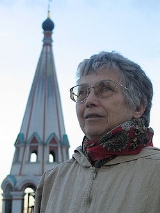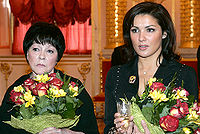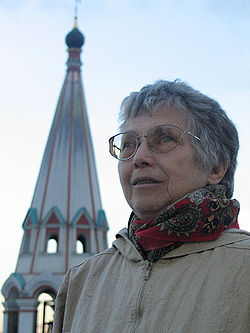
Women in Russia
Encyclopedia


Russia
Russia or , officially known as both Russia and the Russian Federation , is a country in northern Eurasia. It is a federal semi-presidential republic, comprising 83 federal subjects...
n society remains at least as problematic as it was in previous decades. In both cases, a number of nominal legal protections for women either have failed to address the existing conditions or have failed to supply adequate support. In the 1990s, increasing economic pressures and shrinking government programs left women with little choice but to seek employment, although most available positions were as substandard as in the Soviet period, and generally jobs of any sort were more difficult to obtain. Such conditions contribute heavily to Russia's declining birthrate
Population decline
Population decline can refer to the decline in population of any organism, but this article refers to population decline in humans. It is a term usually used to describe any great reduction in a human population...
and the general deterioration of the family
Family
In human context, a family is a group of people affiliated by consanguinity, affinity, or co-residence. In most societies it is the principal institution for the socialization of children...
. At the same time, feminist
Feminism
Feminism is a collection of movements aimed at defining, establishing, and defending equal political, economic, and social rights and equal opportunities for women. Its concepts overlap with those of women's rights...
groups and social organizations have begun advancing the cause of women's rights in what remains a strongly traditional society.
1980s
The Soviet constitution of 1977 stipulated that men and women have equal rights, and that women have equal access to education and training, employment, promotions, remuneration, and participation in social, cultural, and political activity. The Soviet government also provided women special medical and workplace protection, including incentives for mothers to work outside the home and legal and material support of their maternal role. In the 1980s, that support included 112 days of maternity leave at full pay. When that allowance ended, a woman could take as much as one year of additional leave without pay without losing her position. Employer discrimination against pregnantPregnancy
Pregnancy refers to the fertilization and development of one or more offspring, known as a fetus or embryo, in a woman's uterus. In a pregnancy, there can be multiple gestations, as in the case of twins or triplets...
and nursing women was prohibited, and mothers with small children had the right to work part-time. Because of such provisions, as many as 92 percent of women were employed at least part-time, Soviet statistics showed.
Despite official ideology, in practice most Soviet women did not enjoy the same position as men in society, or within the family. Average pay for women in all fields was below the overall national average, and the vaunted high percentage of women in various fields, especially health care, medicine, education, and economics, did not hold true in the most prestigious and high-paying areas such as the upper management of organizations in any of those fields. Women were conspicuously underrepresented in the leadership of the Communist Party of the Soviet Union
Communist Party of the Soviet Union
The Communist Party of the Soviet Union was the only legal, ruling political party in the Soviet Union and one of the largest communist organizations in the world...
(CPSU); in the 1980s, they constituted less than 30 percent of party membership and less than 5 percent of the party Central Committee, and no woman ever achieved full membership in the Politburo.
1990s
Most of the nominal state benefit programs for women continued into the post-Soviet era. However, as in the Soviet era, RussianRussians
The Russian people are an East Slavic ethnic group native to Russia, speaking the Russian language and primarily living in Russia and neighboring countries....
women in the 1990s predominated in economic sectors where pay is low, and they continued to receive less pay than men for comparable positions. In 1995 men in health care earned an average of 50 percent more than women in that field, and male engineers received an average of 40 percent more than their female colleagues. Despite that, on average, women were better educated than men, women remained in the minority in senior management positions. In the later Soviet era, women's wages averaged 70 percent of men's; by 1995 the figure was 40 percent, according to the Moscow-based Center for Gender Studies. According to a 1996 report, 87 percent of employed urban Russians earning less than 100,000 ruble
Ruble
The ruble or rouble is a unit of currency. Currently, the currency units of Belarus, Russia, Abkhazia, South Ossetia and Transnistria, and, in the past, the currency units of several other countries, notably countries influenced by Russia and the Soviet Union, are named rubles, though they all are...
s a month were women, and the percentage of women decreased consistently in the higher wage categories.
According to reports, women generally are the first to be fired, and they face other forms of on-the-job discrimination as well. Struggling companies often fire women to avoid paying child care benefits or granting maternity leave, as the law still requires. In 1995 women constituted an estimated 70 percent of Russia's unemployed, and as much as 90 percent in some areas.
Abuse
Sociological surveys show that sexual harassmentSexual harassment
Sexual harassment, is intimidation, bullying or coercion of a sexual nature, or the unwelcome or inappropriate promise of rewards in exchange for sexual favors. In some contexts or circumstances, sexual harassment is illegal. It includes a range of behavior from seemingly mild transgressions and...
and violence
Violence
Violence is the use of physical force to apply a state to others contrary to their wishes. violence, while often a stand-alone issue, is often the culmination of other kinds of conflict, e.g...
against women increased at all levels of society in the 1990s. More than 13,000 rape
Rape
Rape is a type of sexual assault usually involving sexual intercourse, which is initiated by one or more persons against another person without that person's consent. The act may be carried out by physical force, coercion, abuse of authority or with a person who is incapable of valid consent. The...
s were reported in 1994, meaning that several times that number of that often-unreported crime probably were committed. In 1993 an estimated 14,000 women were murdered by their husbands or lovers, about twenty times the figure in the United States and several times the figure in Russia five years earlier. More than 300,000 other types of crimes, including spousal abuse, were committed against women in 1994; in 1996 the State Duma
Duma
A Duma is any of various representative assemblies in modern Russia and Russian history. The State Duma in the Russian Empire and Russian Federation corresponds to the lower house of the parliament. Simply it is a form of Russian governmental institution, that was formed during the reign of the...
(the lower house of the Federal Assembly, Russia's parliament) drafted a law against domestic violence
Domestic violence
Domestic violence, also known as domestic abuse, spousal abuse, battering, family violence, and intimate partner violence , is broadly defined as a pattern of abusive behaviors by one or both partners in an intimate relationship such as marriage, dating, family, or cohabitation...
.
The "double burden"
Working women continue to bear the "double burden" of a job and family-raising responsibilities, in which Russian husbands generally participate little (except in some rural communities). In a 1994 survey, about two-thirds of women said that the state should help families by paying one spouse enough to permit the other to stay at home. Most women also consider their role in the family more difficult than that of their husband. Such dissatisfaction is a factor in Russia's accelerating divorceDivorce
Divorce is the final termination of a marital union, canceling the legal duties and responsibilities of marriage and dissolving the bonds of matrimony between the parties...
rate and declining marriage rate. In 1993 the divorce rate was 4.5 per 1,000 population, compared with 4.1 ten years earlier, and the marriage rate declined from 10.5 per 1,000 population in 1983 to 7.5 in 1993. In 1992 some 17.2 percent of births were to unmarried women. According to 1994 government statistics, about 20 percent of families were run by a single parent —the mother in 94 percent of cases.
Often women with families are forced to work because of insufficient state child allowances and unemployment
Unemployment
Unemployment , as defined by the International Labour Organization, occurs when people are without jobs and they have actively sought work within the past four weeks...
benefits. Economic hardship during the 1990s drove some women into prostitution
Prostitution
Prostitution is the act or practice of providing sexual services to another person in return for payment. The person who receives payment for sexual services is called a prostitute and the person who receives such services is known by a multitude of terms, including a "john". Prostitution is one of...
. In the Soviet period, prostitution was viewed officially as a form of social deviancy that was dying out as the Soviet Union advanced toward communist policy. In the 1990s, organized crime became heavily involved in prostitution, both in Russia and in the cities of Central and Western Europe, to which Russian women often are lured by bogus advertisements for match-making services or modeling agencies. According to one estimate, 10,000 women from Central Europe, including a high proportion of Russians, have been lured or forced into prostitution
Prostitution
Prostitution is the act or practice of providing sexual services to another person in return for payment. The person who receives payment for sexual services is called a prostitute and the person who receives such services is known by a multitude of terms, including a "john". Prostitution is one of...
in Germany
Germany
Germany , officially the Federal Republic of Germany , is a federal parliamentary republic in Europe. The country consists of 16 states while the capital and largest city is Berlin. Germany covers an area of 357,021 km2 and has a largely temperate seasonal climate...
alone.
Women's organizations
Independent women's organizations –a form of activity that was suppressed in the Soviet era– were formed in large numbers in the 1990s at the local, regional, and national levels. One such group is the Center for Gender Studies, a private research institute. The center analyzes demographic and social problems of women and acts as a link between Russian and WesternWestern culture
Western culture, sometimes equated with Western civilization or European civilization, refers to cultures of European origin and is used very broadly to refer to a heritage of social norms, ethical values, traditional customs, religious beliefs, political systems, and specific artifacts and...
feminist groups. A traveling group called Feminist Alternative offers women assertiveness training. Many local groups have emerged to engage in court actions on behalf of women, to set up rape and domestic violence awareness programs (about a dozen of which were active in 1995), and to aid women in establishing businesses. Another prominent organization is the Women's Union of Russia, which focuses on job-training programs, career counseling, and the development of entrepreneurial skills that will enable women to compete more successfully in Russia's emerging market economy. Despite the proliferation of such groups and programs, in the mid-1990s most Russians (including many women) remained contemptuous of their efforts, which many regard as a kind of Western subversion of traditional (Soviet and even pre-Soviet) social values.
Private employment
The rapidly expanding private sector has offered women new employment opportunities, but many of the Soviet stereotypes remain. The most frequently offered job in new businesses is that of sekretarja (secretarySecretary
A secretary, or administrative assistant, is a person whose work consists of supporting management, including executives, using a variety of project management, communication & organizational skills. These functions may be entirely carried out to assist one other employee or may be for the benefit...
/receptionist), and advertisements for such positions in private-sector companies often specify physical attractiveness as a primary requirement (a requirement that is illegal in governmental organizations). Russian law provides for as much as three years' imprisonment for sexual harassment, but the law rarely is enforced. Although the Fund for Protection from Sexual Harassment has blacklisted 300 Moscow
Moscow
Moscow is the capital, the most populous city, and the most populous federal subject of Russia. The city is a major political, economic, cultural, scientific, religious, financial, educational, and transportation centre of Russia and the continent...
firms where sexual harassment is known to have taken place, demands for sex and even rape still are common on-the-job occurrences.
Political participation
Women's higher profile in post-Soviet Russia also has extended to politics. At the national level, the most notable manifestation of women's newfound political success has been the Women of Russia party, which won 11 percent of the vote and twenty-five seats in the 1993 national parliamentary elections. Subsequently, the party became active in a number of issues, including the opposition to the military campaign in ChechnyaChechnya
The Chechen Republic , commonly referred to as Chechnya , also spelled Chechnia or Chechenia, sometimes referred to as Ichkeria , is a federal subject of Russia . It is located in the southeastern part of Europe in the Northern Caucasus mountains. The capital of the republic is the city of Grozny...
that began in 1994. In the 1995 national parliamentary elections, the Women of Russia chose to maintain its platform unchanged, emphasizing social issues such as the protection of children and women rather than entering into a coalition with other liberal parties. As a result, the party failed to reach the 5 percent threshold of votes required for proportional representation in the new State Duma, gaining only three seats in the single-seat portion of the elections. The party considered running a candidate in the 1996 presidential election but remained outside the crowded field.
A smaller organization, the Russian Women's Party, ran as part of an unsuccessful coalition with several other splinter parties in the 1995 elections. A few women, such as Ella Pamfilova
Ella Pamfilova
Ella Pamfilova is a Russian politician, former deputy of the State Duma, candidate for President in 2000 and former chairman of the Civil Society Institution and Human Rights Council of the Russian Federation.-Biography:...
of the Republican Party, Socialist Workers' Party chief Lyudmila Vartazarova, and Valeriya Novodvorskaya, leader of the Democratic Union, have established themselves as influential political figures. Pamfilova has gained particular stature as an advocate on behalf of women and elderly people.
Soldiers' Mothers Movement
The Soldiers' Mothers Movement was formed in 1989 to expose human rights violations in the armed forces and to help youths resist the draft. The movement has gained national prominence through its opposition to the war in ChechnyaChechnya
The Chechen Republic , commonly referred to as Chechnya , also spelled Chechnia or Chechenia, sometimes referred to as Ichkeria , is a federal subject of Russia . It is located in the southeastern part of Europe in the Northern Caucasus mountains. The capital of the republic is the city of Grozny...
. Numerous protests have been organized, and representatives have gone to the Chechen capital, Groznyy, to demand the release of Russian prisoners and locate missing soldiers. The group, which claimed 10,000 members in 1995, also has lobbied against extending the term of mandatory military service.
Government officials
Women have occupied few positions of influence in the executive branch of Russia's national government. One post in the Government (cabinet), that of minister of social protection, has become a "traditional" women's position; in 1994 Ella Pamfilova was followed in that position by Lyudmila Bezlepkina, who headed the ministry until the end of President Boris YeltsinBoris Yeltsin
Boris Nikolayevich Yeltsin was the first President of the Russian Federation, serving from 1991 to 1999.Originally a supporter of Mikhail Gorbachev, Yeltsin emerged under the perestroika reforms as one of Gorbachev's most powerful political opponents. On 29 May 1990 he was elected the chairman of...
's first term in mid-1996. Tat'yana Paramanova was acting chairman of the Russian Central Bank for one year before Yeltsin replaced her in November 1995, and Tat'yana Regent has been head of the Federal Migration Service since its inception in 1992. Prior to the 1995 elections, women held about 10 percent of the seats in parliament: fifty-seven of 450 seats in the State Duma and nine of 178 seats in the upper house of parliament, the Federation Council. The Soviet system of mandating legislative seats generally allocated about one-third of the seats in republic-level legislatures and one-half of the seats in local soviets to women, but those proportions shrank drastically with the first multiparty elections of 1990.

